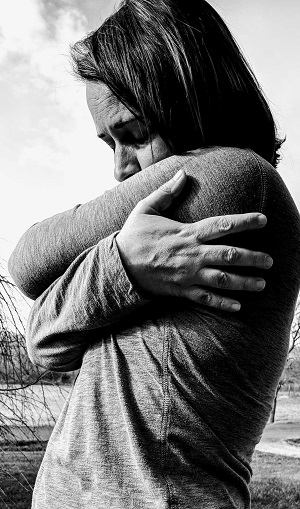Dear You,
The reality of recovery from addiction is that one has to walk side-by-side with ever-present, unmet, unmeetable longing. Some people experience this more intensely than others; sometimes an individual experiences this more intensely than at other times. For some people, the longing fades like the details of a bad dream. But the mysterious “turn” that happens in the brain from addiction can make that longing elemental, experienced in the heart, mind, body, and spirit.
 And a person has to do this walk, sometimes limping, without direct help. Other than a few medications for some substance use disorders, no one knows how to make the longing that underpins those “impairments in…voluntary control over substance use”* go away.
And a person has to do this walk, sometimes limping, without direct help. Other than a few medications for some substance use disorders, no one knows how to make the longing that underpins those “impairments in…voluntary control over substance use”* go away.
When someone is asked to consider abstaining, or is mandated to abstain, that’s the inhumane reality they face. Abstaining risks the anguish, with one’s whole being, of, to quoth Poe’s raven, “Nevermore.”
If you are someone who is thinking about, or mandated to, abstain long-term, here are my simplest, most direct suggestions. They are based on my reviews of the research on addiction, my professional training and experience, and my personal experience developing alcohol use disorder in association with a school shooting occurring in my small, rural, college town.)
(This advice is based on the assumption you are medically stable, have detoxed through medical monitoring, and/or have been medically cleared as having successfully detoxed on your own, and/or are stable on medication treatment. You either have received, or have appointments to receive, medical care for the medical conditions that can accompany addiction.)
Give yourself a big hug. This is sad and hard.
With hope that knowing possibilities may offer you calm and resolve – and with hope that those who love you may understand a little better – these may be true:
- How you currently feel, what you feel, and what you think without alcohol and other drugs may last.
- The improvement in feeling, thinking, and physical condition – even bliss – that you experienced with substances may not be possible without the substances.
- You may always have to hold opposing truths in your mind: “I want” AND “I don’t want.”
- Spontaneity may be endangering.
- Mandating perfect standards for imperfect humans is cruel, especially when they are ill. Inability to abstain is the primary symptom of the illness of substance use disorder. Abstinence is a cruel standard.
The possibility of these challenges does not preclude the presence of other meaningful and satisfying alternatives. For now, the task is not to try to make these realities go away, but to figure out how to live with them without using or drinking. To abstain, then, we must help ourselves not use or drink.
Ways that might help you not use or drink:
1a. Figure out what alcohol and/or drugs, themselves, did for you originally. Focus on then, not now, on before, not during. (This may be challenging, but try. Use may be essentially automatic now. Given a perfect storm – addiction is actually rare, i.e. only 1 in 10 Americans has it – of pre-existing conditions, and enough use for long enough, if the “turn” happens, it’s a brain thing that no one can figure out.)
1b. Find ways to do manually what alcohol and drugs did automatically. (In vastly oversimplified, general terms, substances help people “Feel better,” “Feel good,” or “Do better,” by adjusting the volume on emotions, focusing or distracting attention, prioritizing thoughts, and/or providing physical stimulation or comfort.) The new ways have to work no matter what happens – however shocking, painful, joyous, or boring.
2a. Figure out what the process, itself, of drinking alcohol and doing drugs did for you.
2b. Accept that nothing will probably ever duplicate what substances did, and anything may only ever be “good enough.” Still, find enough “good enough” replacements, enough of the time, with enough safe people, meaningful enough to you, that meet your needs, that sorta, kinda do what substances did. It will take a bunch of them. One thing might be necessary, but no one thing is likely to be sufficient over the long-term, although, initially, it might feel that way (falling in love, for example, or feeling embraced by a support group).
3. Think hard, ponder, and muse about the research on addiction that says the way the brain functions with love, bonding, and attachment may be the same as the way the brain functions after addiction has developed. Did our ability to connect, bond, attach, and love get shifted to substances? How do I use this information to help myself not use or drink? Is the ever-present ache and longing I feel since the death of _______ or the loss of _______ related to how I feel while abstaining? Is how I keep putting one foot in front of the other after that loss how I can help myself keep going without substances? Might finding other people, things, and ways to connect – even love – help me not use or drink?
4. Be self-kind. If it’s possible – again, stated in grossly oversimplified terms – that love may directly treat the brain for addiction, then it’s practical for me to have empathy, compassion, and love for myself. It also helps me “Feel better,” “Feel good,” and “Do better,” especially when compared with the excruciating experience of self-judgment and self-reprimand.
Give yourself a hug again. And again. I know this is starting out sad and hard for you. But it’s possible that basic humanity and applying the research on addiction may actually help things end up being pretty okay, maybe even pretty soon. Wouldn’t it be something that, after medical care, simply being thoughtful, kind, and caring towards ourselves might help us recover from addiction?
Wishing you the very best,
Anne Giles
Blacksburg, Virginia
January 10, 2018
* “A substance use disorder is a medical illness characterized by clinically significant impairments in health, social function, and voluntary control over substance use.” Facing Addiction in America: The Surgeon General’s Report on Alcohol, Drugs and Health, 2016, Page 4-1
This post is part of a series. The table of contents, with links, is here.
Photo: “Self-hug” of Casey Sapienza by Mia Sapienza
The views expressed are mine alone and do not necessarily reflect the positions of my employers, co-workers, clients, family members or friends. This content is for informational purposes only and is not a substitute for medical or professional advice. Consult a qualified health care professional for personalized medical and professional advice.
